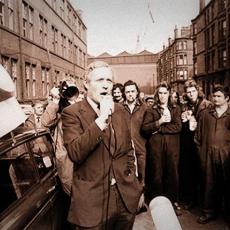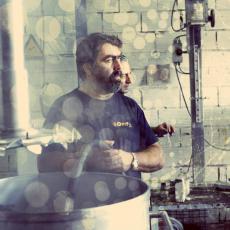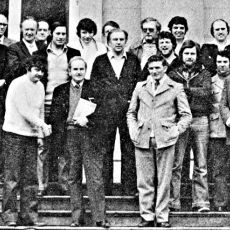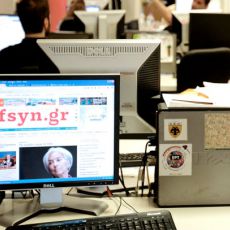Fire the Boss!
Naomi Klein & Avi Lewis on "The Worker Control Solution from Buenos Aires to Chicago"
Shock Doctrine author Naomi Klein and Al Jazeera host Avi Lewis discuss the workers who are taking over their factories and plants rather than lose their jobs, some to owners who owe money to bailed-out banks. They also address the latest news in the nation’s global economic collapse amidst the White House and Democratic-led Congress’s rejection of single-payer healthcare. [includes rush transcript]
TRANSCRIPTJUAN GONZALEZ: With the nation’s unemployment at 8.9 percent, the highest it’s been in over twenty-five years, workers across the country are fighting in a variety of ways to keep their jobs.
Nearly a thousand workers at the Chicago-based apparel firm Hart Schaffner & Marx, or Hartmarx, recently voted to “sit in” to save their jobs in an effort to prevent Wells Fargo from liquidating the factories.
In December, at the Republic Windows and Doors factory in Chicago, workers occupied the factory floor after the plant’s owners gave employees just three days’ notice of the plant’s closure. The workers ended their six-day occupation after winning a settlement securing the reopening of the plant under new management.
AMY GOODMAN: Later in the show, we’ll be joined by Armando Robles, a union leader and maintenance worker at the former Republic Windows and Doors factory.
But first, we turn to journalists Naomi Klein and Avi Lewis. In 2004, they produced the documentary The Take about workers in Argentina taking over the factories abandoned by their owners. Naomi is author of a number of books, including The Shock Doctrine: The Rise of Disaster Capitalism and No Logo. Avi Lewis is the host of the news show Fault Lines on Al Jazeera English. They’re speaking tonight at Cooper Union here in New York at an event called “Fire the Boss: The Worker Control Solution from Buenos Aires to Chicago.”
We welcome you both to Democracy Now! Naomi, before we go into these various takeovers from Argentina to Chicago, your comment on the latest situation with the banks? We haven’t seen you since, well, soon after the various bailouts.
NAOMI KLEIN: And they’re ongoing. I mean, I wish things had gotten better since we last spoke. And I think I called the bank bailout the biggest heist in monetary history back then, and it’s just gotten bigger. We’ve seen just an absolutely unprecedented transfer of public wealth into private hands. And, you know, what I’ve been saying from the beginning, I think it’s becoming even clearer now, which is that the crisis in the financial sector is not being solved, it’s being moved. A private-sector crisis is being transformed into a public-sector crisis, in the sense of the huge deficit that’s being left behind because of this bailout, which isn’t even doing what it’s supposed to be doing in terms of restoring credit and fixing the real economy.
So the price of this is — if it isn’t fixed, is going to be paid in cutbacks to healthcare, to Social Security. We aren’t even — we haven’t felt the full shock yet. And that’s my concern. Yes, I’m concerned about what’s going on now, but I’m concerned about how this transfer of wealth is going to be paid for down the road in terms of the meager social services that Americans get in exchange for their tax dollars.
JUAN GONZALEZ: Well, and yet, you’re seeing now, at least in the stock market, the bank stocks, as well as some of the others, at least leveling off or beginning to rise again, even as unemployment continues at record levels, new people that are thrown out into the street every month.
NAOMI KLEIN: You know, and during the election campaign, you know, I think what Obama articulated so well is the fact that people realize that what’s good for Wall Street isn’t necessarily good for Main Street. And he said, you know, we’ve had this top-down approach, giving more and more to people at the top, waiting for it to trickle down, and he promised that that would change.
Quite the contrary. What’s actually happened is that homes, jobs have been sacrificed in order to stabilize the financial sector.
So what I’m really worried about is that what we’re seeing, if this, quote-unquote, “works” — and, of course, that’s up for debate, and we have some very respected economists, like Joseph Stiglitz and Paul Krugman, who have said very clearly that they don’t even think this is going to save the financial sector, that we don’t — we haven’t even addressed the depth of that crisis, because we don’t even know the extent of the toxic debts. But even if it does work, you know, even if we suspend disbelief and believe that it does work, what I’m worried about is that this is the new normal, that the banks are being saved on the backs of union workers, on the backs of what’s left of the manufacturing sector, on the backs of homeowners. And so, what becomes the new normal after the crisis is an even more deeply divided country, an even more de-industrialized country.
And that’s why we’re highlighting tonight, in this event that we’re doing at Cooper Union, and bringing in workers who are on the frontlines of this struggle to tell their stories of how they’re trying to save their workplaces, is that, you know, we need to address this now, because this is — we don’t want this to be the new normal.
JUAN GONZALEZ: I wanted to ask you, because you seem to be focusing more on how workers and ordinary Americans can respond themselves, but we’ve seen, for instance, the Service Employees International Union, SEIU, launch this huge corporate campaign against Bank of America to get the union and citizen groups to get involved and trying a shareholder revolt to remove Ken Lewis. I reported at theDaily News that SEIU, while it was doing that, was also increasing the amount of money it personally, the union, was borrowing from Bank of America.
NAOMI KLEIN: Yeah.
JUAN GONZALEZ: And — but this effort to direct the struggle toward shareholder actions rather than actual grassroots organizing in these communities?
NAOMI KLEIN: Well, you know, that’s why I think that the case of the Republic Windows and Doors factory is so interesting — and, you know, looking forward to hearing from Armando later in the show — is that I think it is really important for the labor movement to talk about the injustice of the bailout, to do a huge amount of popular education, but for me, it’s less about changing the CEO at the top and more about highlighting the incredible double standards. And that was why the Republic Windows and Doors occupation became such a — not just a national symbol, but an international symbol, because the workers in that factory, with their union leadership at UE, which is a smaller, very democratic union, decided that they were not just going to highlight the actions of their bosses, the owners of their factory, but the actions of Bank of America, in the fact that they had gotten bailout money and that they had refused a line of credit.
So, here you had, you know, the country in an — outraged over the fact that so much taxpayer money had gone to these banks, in the name of increasing credit, and then they’re finding out that the banks aren’t actually lending. But here you have this very concrete case where the banks didn’t lend to a workplace that needed it, the workers were paying the price, and so here you had the sort of injustice, the double standards of the bailout, and their slogan, “You got bailed out; we got sold out,” you know, in microcosm.
So I think that, to me, that is a much more — a better use of the targeting of the banks than changing the — going after, you know, the CEOs at the top, because I think we have this illusion that when you change the CEO, then something deep is happening. And that becomes almost synonymous with re-regulation, which is what we really need in the financial sector. And if we think back to the ’30s, you know, in FDR’s first hundred days, he got Glass-Steagall passed. We’ve seen no serious re-regulation of the financial sector. And so, when we just focus on changing the leadership and that kind of shareholder activism, I think we have the illusion that there is a sort of real re-regulation going on in the financial sector, and it’s just not happening. And that’s what we need the labor union — labor movement to be saying.
AMY GOODMAN: Well, before we go to Chicago and Argentina, Avi Lewis, I did want to ask you about, well, the industry that isn’t getting quite as much as the banks. That’s the auto industry. And you’re just back from Detroit. Chrysler announcing plans to close, what, nearly 800 dealerships, a quarter of its retail chain; General Motors is expected to follow suit today with closing a thousand dealerships. Taken together, it could mean something like 90,000 workers will lose their jobs.
AVI LEWIS: Well, I just spent a week in Detroit doing the latest episode of Fault Lines on the auto crisis and the way it’s being experienced on the ground by workers in where the auto sector used to have its home. What’s fascinating about what I learned, that is not being talked about right now, has to do with the financialization of the auto sector and of all American corporations and the way that that is now taking a real hit out on working people.
So, you have, in the stress tests, remember, one of the biggest insolvencies that was revealed was the financing arm of GM, GMAC, which has an $11 billion hole in its balance sheet, which the public is going to backstop, which we’re going to pay for, because — and this is what’s not being told — GM, the credit arm, and the Ford credit arm, in different degrees, and Chrysler’s, too, were gambling in derivatives, because there were super profits to be made when the bubble was being inflated. We have a lack of productive investment in the auto sector, which has been going on for three decades, while they’ve been financializing.
So you see immediately the Treasury Department is prepared to bail out the financial arm of GM, while GM and Chrysler are both being forced into bankruptcy. So, not only do you have the financialization of the sector and the bailouts for the financial arms, which dwarf the others, you also have the logic of the vulture capitalist at work in the auto sector.
Why are they being driven into bankruptcy? Why is there such a rush to go into the bankruptcy process? I interviewed Ralph Nader, who’s been following the auto industry for a little while now, and he said that basically it’s about driving — it’s speculative capitalist logic to drive the companies down to get — to squeeze what can be squeezed — unemployment and layoffs always rise a stock price — to cash out on the bounce back.
If you look at the Auto Industry Task Force that President Obama has appointed, there’s no one from the auto sector there. Most of them are investment bankers, and they’re looking at this as a classic corporate restructuring, where you’re focused on the share price, where you’re focused on the bounce back, where you’re getting billions of dollars of public money. Jobs are just simply not the focus there. So the auto industry is subject to some of the same special treatment when it comes to the financing arms, but to a very different standard when you’re talking about the actual workers.
And so, that’s why we’ve seen worker occupations in the auto sector, too. In Canada, there have been four plant occupations in the last four months, I think, all of them plants that were closed suddenly and abruptly without the proper notification; severance packages, which are up in the air, maybe drifting away; and workers leaping to their feet in this moment and saying, “Wait a second. There’s trillions of dollars of public money, which are being —- which is being funneled to certain kinds of businesses. Where’s our bailout?” That’s a powerful call.
JUAN GONZALEZ: But yet, some of the Republican critique of the bailout crafted by the Obama administration of the auto industry is that Obama is favoring the unions and the workers, that, in essence, now the UAW will end up, for instance, in the Chrysler situation, as one of the main owners of the new company.
AVI LEWIS: Well, you know, now we’re talking about healthcare. Now we’re talking about single-payer healthcare, and I’ll tell you why. It costs the Big Three $1,500 more per car in healthcare costs alone than their rivals, who are either working in countries like Canada that have universal healthcare or who aren’t subject to those costs, like the Japanese automakers. So, they -—
AMY GOODMAN: So, they pay more for healthcare than they pay for steel.
AVI LEWIS: Exactly.
AMY GOODMAN: They can’t compete with the foreign companies —-
AVI LEWIS: Right.
AMY GOODMAN: —- because they’re from countries that have single payer.
AVI LEWIS: Right.
AMY GOODMAN: And you’re from Canada, which is very interesting. You have an interesting perspective.
AVI LEWIS: Well, one of the reasons that the auto industry has been so strong in Canada all these years is that, you know, it’s so much cheaper for the Big Three to do production just over the river, you know, in Windsor, from Detroit, because those healthcare costs are covered by society rather than by the companies.
So when we talk about the UAW owning half of the new Chrysler or half of the new GM, we’re not actually talking about worker ownership or, let alone, worker management. They’ll only get one seat on the board. What we’re talking about is the $20 billion, for instance, that GM owes to workers in healthcare obligations. They’re getting half of that in cash, and they’re getting half of that in stock of the next company.
So the union is gambling that the new company will do well enough that it will be able to honor the healthcare obligations to its own workers, which GM always had contractually, which the union exchanged and agreed to manage as part of decades of concessions. And now, it’s the United Auto Workers health fund which will own half of the new company. That’s a gamble, that the new company will be strong enough to pay for healthcare obligations, which should have been universalized a long time ago.
NAOMI KLEIN: You know, I just would just add, you know, that clip that you played earlier of Obama saying, you know, we’re not starting from scratch — true, no country is ever starting from scratch. But when you look at the way all of these various crises are interrelated, the healthcare crisis with the financial sector crisis with the manufacturing sector crisis, you could not imagine a moment when there — which was more ripe for possibility of actually stepping back and going, “This whole thing is broken; how do we rebuild this in a way that makes sense?” There’s not going to be another moment like this, Amy, you know?
AMY GOODMAN: And that’s interesting that they’re not questioning nationalizing the debt of — and bailing out these banks and these other companies, like AIG, but they question nationalizing the cost of healthcare, which involves everyone.
NAOMI KLEIN: Yes, that this — they agree with the Republicans: that would be socialism. So, yes, it’s true. Avi and I are from a socialist — the socialist country of Canada, would that it were so.
AMY GOODMAN: We’re talking to Naomi Klein and Avi Lewis. Avi works at Al Jazeera, does a broadcast called Fault Lines on Al Jazeera English. And he is the director of The Take, which Naomi Klein made also, about Argentina. When we come back, we’re going to go to Chicago to find out about the takeover of a factory, and we’ll also be going to Argentina. This is Democracy Now! Stay with us.
[break]
AMY GOODMAN: We’re going to go to Chicago and then to Argentina to look at these takeovers of plants. Our guests, Naomi Klein and Avi Lewis. But, Avi, can you just give us an overall summary of what’s happening with these plant takeovers around the world?
AVI LEWIS: Well, I mean, as much as financial bailouts and financial crisis gets covered, we get unemployment numbers, we get fewer faces, but the crisis is people are losing their jobs in staggering numbers around the planet. And we’re starting to see the kind of pushback and the kind of worker fight back that we saw in Argentina after the economic crash there and that led to a whole new movement of worker-run businesses.
I’ve been tracking some of these developments, and many of them will be familiar to your viewers and listeners. But just so you know, in Argentina just in the last four months, they’ve had more worker takeovers of businesses in the last four months than they had in the previous four years. And this is the country which is the leader in worker takeover of the means of production.
In the UK, you have the Visteon auto plant, which was — there were three plants spun off from Ford in 2001. The workers there got six minutes’ notice that their workplaces were closing. I mean, the Republic Windows and Doors in Chicago, they got a few days. They got six minutes in Visteon. So, hundreds of workers did a sit-in on the roof of their plant. They were hard bargaining for about ten weeks. They ended up with a severance offer that was ten times what they were initially offered. So that’s a huge victory, although there’s still a lot of mistrust between the workers and the equity fund, which they’re negotiating with, so they’re not over there.
The famous Waterford Crystal plant in Ireland, by Wedgwood China, owned by Wedgwood China, was occupied by seven weeks earlier this year. It had been taken over by a US private equity firm. So there’s a lot going on in Europe around the foreign takeover of their production capacity.
I mentioned in Canada there have been auto plant occupations.
In France, there’s been this wave of bossnappings, where workers have been holding their bosses hostage in the workplace after seven takeovers.
JUAN GONZALEZ: Definitely don’t get that out. Don’t get that publicized.
AVI LEWIS: Well, you know, but the thing is, it’s France, so, for instance, when they held the chief executive of the plant in — the 3M plant in France, they brought himmoules et frites, they brought him mussels and French fries for dinner. So there’s — you know, there’s a level of civilization in the bossnappings there. But Caterpillar and Sony and Hewlett-Packard and other multinational corporations have faced this bossnapping technique.
And then we have in Poland, just this week, the largest coal coking producer in all of Europe. Thousands of workers bricked up the entrance to the company headquarters, because their wages had been cut.
And then we’ve seen Republic here in the United States and the Hartmarx story, this famous legendary suit maker that’s been in business more than 120 years. They made Obama’s suit that he wore on election night in Chicago. They made his tuxedo that he wore for some of the inauguration balls. And they are now facing bankruptcy at the hands of Wells Fargo, which has received $25 billion of public money.
So we see this dynamic playing out in different ways in different countries, but there’s no question that there’s an international wave of pushback. And the question is, where is it going? What forms will it take? And how do we talk about it in a way that formulates it as constructive alternatives to this economic crisis that are coming from below, because the bailouts have all been top-down?
NAOMI KLEIN: One point to just add about Wells Fargo and, you know, the suit factory in Chicago is just, you know, here we’re once again seeing just the lack of logic in the way the so-called bailout is being run, because there’s been — even though, you know, the right is constantly calling the Obama administration socialist, what we’ve actually seen is an absolute unwillingness to use the power that they should be getting by bailing out the banks to restructure the sector. And, you know, when you see these banks getting bailout money and not supporting factories that — at least in theory, this administration wants to protect manufacturing jobs. They ran a campaign saying we’re going to do this. Now, if you accepted your responsibility — the responsibility that comes from bailing out these banks, then you could actually have the power to direct those banks to lend money, to issue credit, in the interests of your other priorities, right? And so, that would be true for homeowners, and it would also be true for these factories that are being closed.
So, you know, there is this — I think it’s really important for us to understand that the Obama administration is still, you know, in the grips of this laissez-faire ideology, even as they break the core rules by intervening in the economy in such dramatic fashion. They’re intervening, but at the same time they’re saying, “Well, we don’t want to run the banks,” you know? So you have a situation like Citibank, which is worth, I think, the last I checked, $21 billion on the books, but yet $45 billion of taxpayer money has gone in. So, by all rights, American taxpayers should own Citibank more than twice over, which would mean they could direct Citibank to issue credit in the interests of taxpayers, in the interests of the public. But clearly, that’s not happening, or these factories wouldn’t be closing.
JUAN GONZALEZ: And all this money seems to be going from government guarantees or direct loans to the banks, yet you’re not seeing — you’re not seeing a situation where, for instance — now Congress has already caved in on being able to pass legislation that would allow judges to renegotiate situations where homeowners were facing foreclosure, and you’re not seeing the money go to the people who need it. It’s being spent largely, it seems, on paying off the derivative contracts that have gone bad.
NAOMI KLEIN: Well, Dick Durbin said it best. He said, you know, the banks still own this place, right? Referring to Congress and the Senate. And what’s so extraordinary about that is that Americans should own the banks, because they paid for them. Now, if that happened, then they could actually own their own government again. Wouldn’t that be revolutionary?
AMY GOODMAN: Now, maybe the missing ingredient here is the media to be asking these critical questions. I mean, who is holding those who are being bailed out and those who are bailing them out to account, Avi?
AVI LEWIS: There’s no question that there’s a huge opportunity here, which is being missed by mainstream media. But that’s not earth-shaking news to viewers and listeners of Democracy Now!
What’s interesting, though, is that workers, in many cases now, are giving the media a story. And one of the incredible things about the Republic Windows and Doors story, didn’t happen in Argentina in the wave of takeovers there; it happened subsequently, as films like The Take and others made the rounds, and people learned about what was happening there. You get worker-led constructive alternatives, which are so dramatic and so different that then they get coverage. And then you have media being forced to take notice.





Comments
Post new comment